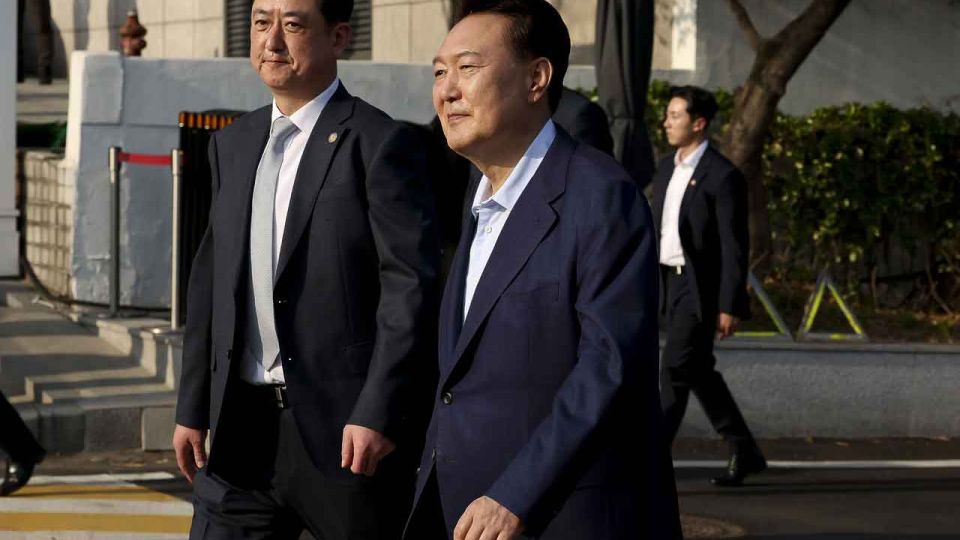April 14, 2025
SEOUL – Disgraced former President Yoon Suk Yeol is set to stand trial Monday on charges of orchestrating an insurrection through his declaration of martial law on Dec. 3, 2024, marking his first formal court appearance since being removed from office by the Constitutional Court early this month.
The first hearing, at which Yoon is required to appear, is to take place at the Seoul Central District Court and has drawn criticism for shielding the ousted leader from public view — a departure from the manner in which former presidents were tried in criminal court.
According to the court, the criminal trial will begin with Yoon’s attendance at 10 a.m. and the former president will be allowed to enter the court building via an underground parking lot, minimizing public exposure.
The court explained the decision was made for security considerations, possible inconvenience to other petitioners and for the protection of the court building.
Though defendants are not obligated to appear in court for the preparatory hearing, in which the court discusses how the trial is to proceed, they must attend formal hearings of a criminal trial in person.
The hearing comes 54 days after Yoon attended the first preliminary hearing of his trial on Feb. 20. Yoon remained silent in that hearing.
The court also announced that the media will not be allowed to take photographs or videos inside the courtroom for the Monday hearing.
The judge may grant permission for courtroom photography upon the defendant’s agreement. Even without the defendant’s consent, the court can approve photography or filming inside the courtroom if it is deemed necessary for the public interest.
The court did not give a specific reason as to why it opted not to allow photography or video.
Both the first formal hearings of former President Park Geun-hye’s abuse of power case in 2017 and former President Lee Myung-bak’s bribery and embezzlement case in 2018 were made public via the media.
The court at that time allowed Park and Lee’s court appearances to be made public after considering the high level of public interest in the cases, their significance and the broader public benefit.
In a press briefing held at the National Assembly on Saturday, Rep. Lee Geon-tae, spokesperson of the main opposition Democratic Party of Korea, criticized the court’s decision, calling it an “undeniable privilege.”
Lee stated that the court cannot be unaware of the significant public interest related to Yoon’s criminal trial.
“The decision to allow Yoon, who is accused as the ringleader of an insurrection, to use the underground parking lot for court entry lacks justification and legitimacy,” Lee said.
Lee argued that Yoon had previously received preferential treatment as the court arbitrarily interpreted the law to cancel his detention and the prosecution decided to waive its right to appeal that decision.
The lawmaker said it was unacceptable for Yoon to continue receiving special treatment even after his removal from the presidency by the Constitutional Court’s ruling.
Lee added that public suspicion of the court will only continue to rise with procedural privileges being granted to Yoon before legal proceedings formally begin.
Meanwhile, Yoon — who was indicted on a charge of insurrection on Jan. 26 — and his legal representatives are expected to deny the charges, maintaining their original stance in the pretrial hearing in February.
Some in legal circles expect Yoon to repeat similar statements to those previously made during his impeachment trial. Those include his claims that the short-lived martial law was made to act against a national crisis and appeal to the public concerning the main opposition party’s attempts to paralyze state affairs.
With his appearance at the Seoul Central District Court’s pretrial hearing of his criminal trial in February, Yoon became the first sitting president to go on trial for criminal charges.
But Yoon is far from the first former president to stand trial, as prior to Yoon, Chun Doo-hwan, Roh Tae-woo, Lee Myung-bak and Park Geun-hye all faced criminal charges after their respective presidencies.
According to the Criminal Act, those convicted of leading an insurrection can face either the death penalty or life imprisonment.
Former President Chun, who was convicted of insurrection, was sentenced to death in his first trial verdict. The Supreme Court confirmed the high court’s ruling that reduced Chun’s sentence to life imprisonment. But he was pardoned by former President Kim Young-sam in 1997, after serving only two years in prison.


